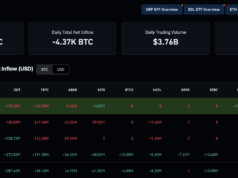MSCI is considering a new rule that would remove companies from its Global Investable Market Indexes if 50% or more of their assets are held in digital assets such as Bitcoin. The proposal appears simple, but the implications are far-reaching. It would affect companies like Michael Saylor’s Strategy (formerly MicroStrategy), Eric and Donald Trump Jr’s American Bitcoin Corp (ABTC), and dozens of others across global markets whose business models are fully legitimate, fully regulated, and fully aligned with long-standing corporate treasury practices.
The purpose of this document is to explain what MSCI is proposing, why the concerns raised around Bitcoin treasury companies are overstated, and why excluding these firms would undermine benchmark neutrality, reduce representativeness, and introduce more instability—not less—into the indexing system.
MSCI launched a consultation to determine whether companies whose primary activity involves Bitcoin or other digital-asset treasury management should be excluded from its flagship equity indices if their digital-asset holdings exceed 50% of total assets. The proposed implementation date is February 2026.
The proposal would sweep in a broad set of companies:
- Strategy (formerly MicroStrategy), a major software and business-intelligence firm that holds Bitcoin as a treasury reserve.
- American Bitcoin Corp (ABTC), a new public company created by Eric and Donald Trump with a Bitcoin-focused balance sheet.
- Miners, infrastructure firms, and diversified operating companies that use Bitcoin as a long-term inflation hedge or capital reserve.
These companies are all publicly traded operating entities with audited financials, real products, real customers, and established governance. None are “Bitcoin ETFs.” Their only distinction is a treasury strategy that includes a liquid, globally traded asset.
JPMorgan analysts recently warned that Strategy could face up to $2.8B in passive outflows if MSCI removes it from its indices, and up to $8.8B if other index providers follow.
Their analysis correctly identifies the mechanical nature of passive flows. But it misses the real context.
Strategy has traded more than $1 trillion in volume this year.
The “catastrophic” $2.8B scenario represents:
- Less than one average trading day
- ~12% of a typical week
- ~3% of a typical month
- 0.26% of year-to-date trading flow
In liquidity terms, this is immaterial. The narrative of a liquidity crisis does not match market structure reality. The larger issue is not the outflow itself—it is the precedent that index exclusion would set.
If benchmark providers begin removing companies because of the composition of their treasury assets, the definition of what qualifies as an “eligible company” becomes political, not financial.
MSCI’s policy position also conflicts with the composition of MSCI’s own assets.
MSCI reports roughly $5.3B in total assets.
More than 70%—about $3.7B—is goodwill and intangible assets. These are non-liquid, non-marketable accounting entries that cannot be sold or marked to market. They are not verifiable in the same way that digital assets are.
Bitcoin, by contrast:
- Trades globally 24/7
- Has transparent price discovery
- Is fully auditable and mark-to-market
- Is more liquid than nearly any corporate treasury asset outside sovereign cash
The proposal would penalize companies for holding an asset that is far more liquid, transparent, and objectively priced than the intangibles that dominate MSCI’s own balance sheet.
MSCI is a global standard-setter. Its benchmarks are used by trillions of dollars in capital allocation. These indices are governed by widely accepted principles—neutrality, representativeness, and stability. The proposed digital-asset threshold contradicts all three.
Neutrality
Benchmarks must avoid arbitrary discrimination among lawful business strategies.
Companies are not removed for holding:
- Large cash positions
- Gold reserves
- Foreign exchange reserves
- Commodities
- Real estate
- Receivables that exceed 50% of assets
Digital assets are the only treasury asset singled out for exclusion. Bitcoin is legal, regulated, and widely held by institutions worldwide.
Representativeness
Indices are meant to reflect investable markets—not curate them.
Bitcoin treasury strategies are increasingly used by corporations of all sizes as a long-term capital-preservation tool. Removing these companies reduces the accuracy and completeness of MSCI’s indices, giving investors a distorted view of the corporate landscape.
Stability
The 50% threshold creates a binary cliff effect.
Bitcoin routinely moves 10–20% in normal trading. A company could fall in and out of index eligibility multiple times a year simply due to price action, forcing:
- Unnecessary turnover
- Additional tracking error
- Higher fund implementation costs
Index providers typically avoid rules that amplify volatility. This rule would introduce it.
Forced Selling
If MSCI proceeds, passive index funds would need to sell holdings in affected companies.
Yet the real-world impact is marginal because:
- Strategy and ABTC are highly liquid
- Flows represent a tiny fraction of normal trading volume
- Active managers are free to continue holding or increasing exposure
Access to Capital
Analysts warn that exclusion could “signal” risk. But markets adapt quickly.
As long as a company is:
- Liquid
- Transparent
- Able to raise capital
- Able to communicate its treasury policy
It remains investable. Index exclusion is an inconvenience—not a structural impairment.
Precedent Risk
If MSCI embeds asset-based exclusion rules, it sets a template for removing companies based on their savings decisions rather than their business fundamentals.
That is a path toward politicizing global benchmarks.
Bitcoin treasury strategies are expanding internationally:
- Japan (Metaplanet)
- Germany (Aifinyo)
- Europe (Capital B)
- Latin America (multiple mining and infrastructure firms)
- North America (Strategy, ABTC, miners, and energy-Bitcoin hybrids)
If MSCI excludes these companies disproportionately, U.S. and Western companies are placed at a competitive disadvantage relative to jurisdictions that embrace digital capital.
Indexes are meant to reflect markets—not pick national winners and losers.
MSCI’s recent handling of Metaplanet’s public offering shows it understands the risks of “reverse turnover.” To avoid index churn, MSCI chose not to implement the event at the time of offering.
This acknowledgement underscores a broader truth: rigid rules can destabilize indices.
A digital-asset threshold creates similar fragility on a much larger scale.
MSCI can achieve transparency and analytical clarity without excluding lawful operating companies.
A. Enhanced Disclosure
Require standardized reporting of digital-asset holdings in public filings.
This gives investors clarity without altering index composition.
B. Classification or Sub-Sector Label
Add a category such as “Digital Asset Treasury–Integrated” to help investors differentiate business models.
C. Liquidity or Governance Screens
If concerns are about liquidity, governance, or volatility, MSCI should use the criteria it already applies uniformly across sectors.
None require exclusion.
The proposal does not solve a real problem.
It creates several:
- Reduces representativeness of global indices
- Violates neutrality by discriminating against a specific treasury asset
- Introduces instability through a binary threshold tied to an asset with normal volatility
- Creates unnecessary turnover for passive funds
- Damages global competitiveness
- Sets a precedent for politicized index construction
Bitcoin is money. Companies should not be penalized for saving money—or for choosing a long-term treasury asset that is more liquid, more transparent, and more objectively priced than most corporate intangibles.
Indexes must reflect markets as they are—not as gatekeepers prefer them to be.
MSCI should withdraw the proposal and maintain the neutrality that has made its benchmarks trusted across global capital markets.
Disclaimer: This content was written on behalf of Bitcoin For Corporations. This article is intended solely for informational purposes and should not be interpreted as an invitation or solicitation to acquire, purchase or subscribe for securities.









